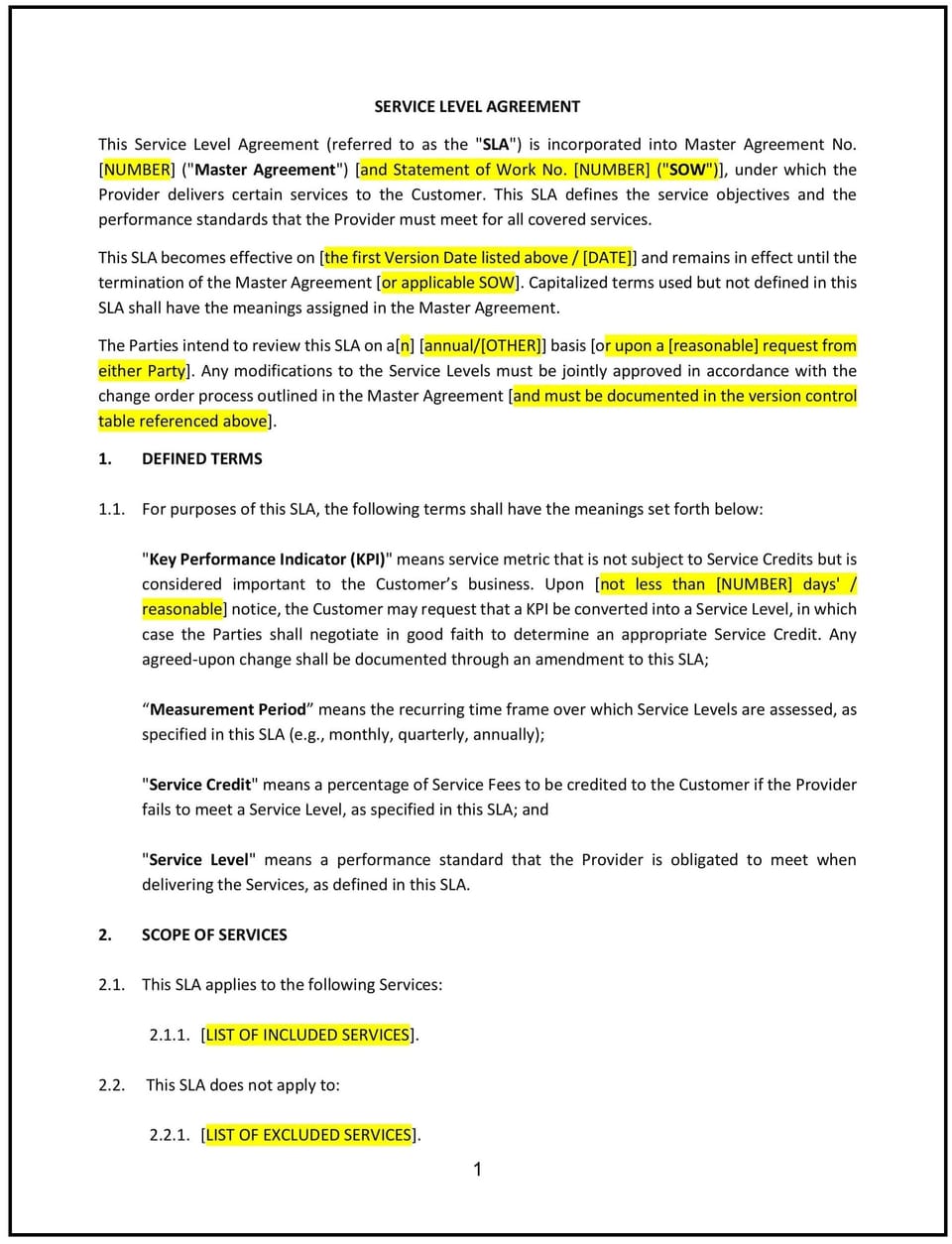Service Level Agreement (SLA) (Mississippi): Free template

Service Level Agreement (SLA) (Mississippi)
A Service Level Agreement (SLA) is a legally binding contract between a service provider and a client, outlining the quality, availability, and responsibilities of the services provided. In Mississippi, SLAs are commonly used in industries like healthcare, manufacturing, telecommunications, and professional services to ensure clear expectations and accountability. Mississippi’s growing economy, with a focus on healthcare, manufacturing, and agriculture, makes SLAs essential for businesses seeking reliable service delivery.
An SLA ensures that both parties understand their obligations, including response times, performance metrics, and remedies for service failures. For example, a healthcare provider in Mississippi might use an SLA to guarantee timely delivery of medical services, while a telecommunications company might use it to ensure network uptime. A well-drafted SLA protects both the service provider and the client by minimizing misunderstandings and fostering trust.
Tips for drafting and maintaining a Service Level Agreement in Mississippi
- Define the scope of services clearly: Specify the services to be provided, including any exclusions or limitations. For example, if the SLA covers IT support, outline the types of support included (e.g., software troubleshooting) and excluded (e.g., hardware repairs).
- Include measurable performance metrics: Define key performance indicators (KPIs) such as uptime percentages, response times, and resolution times. For instance, state that the service provider will respond to support requests within 2 hours and resolve issues within 24 hours.
- Outline remedies for service failures: Specify the consequences if the service provider fails to meet the agreed-upon standards. For example, include provisions for service credits, refunds, or contract termination.
- Address force majeure events: Include clauses that account for unforeseen events, such as natural disasters or pandemics, that may impact service delivery. This ensures fairness for both parties.
- Comply with Mississippi laws: Ensure the SLA adheres to Mississippi’s contract laws and any industry-specific regulations. For example, healthcare SLAs must comply with HIPAA regulations, while telecommunications SLAs must follow FCC guidelines.
- Regularly review and update: Periodically update the SLA to reflect changes in service offerings, client needs, or legal requirements. For instance, if the service provider introduces new services, amend the SLA to include these.
Frequently asked questions (FAQs)
Q: What should a Service Level Agreement include in Mississippi?
A: It should include the scope of services, performance metrics, remedies for service failures, force majeure clauses, and compliance with Mississippi laws. Additionally, it should specify how disputes will be resolved.
Q: How does Mississippi law impact Service Level Agreements?
A: Mississippi’s contract laws emphasize enforceability as long as the terms are clear and reasonable. Businesses must also ensure compliance with industry-specific regulations, such as HIPAA for healthcare or FCC guidelines for telecommunications.
Q: Can an SLA be terminated early in Mississippi?
A: Yes, if the agreement includes a termination clause, either party can terminate the contract with reasonable notice. The terms should specify any penalties or payments due upon termination, ensuring fairness for both parties.
Q: What industries commonly use Service Level Agreements in Mississippi?
A: Industries like healthcare, manufacturing, telecommunications, and professional services frequently use SLAs in Mississippi. For example, healthcare providers might use SLAs to guarantee timely delivery of medical services, while telecommunications companies might use them to ensure network uptime.
Q: How can businesses ensure compliance with Mississippi laws in Service Level Agreements?
A: Businesses should ensure their SLAs comply with Mississippi’s contract laws and industry-specific regulations. Regularly reviewing and updating the agreement is also essential to maintain compliance.
This article contains general legal information and does not contain legal advice. Cobrief is not a law firm or a substitute for an attorney or law firm. The law is complex and changes often. For legal advice, please ask a lawyer.


